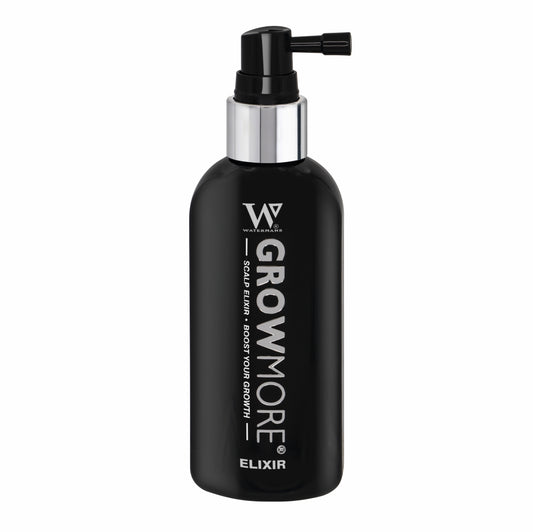Understanding Alopecia Areata: Causes, Symptoms, and Effective Treatment Options
Share

Alopecia areata is a complex autoimmune condition that affects millions of people worldwide. In this article, we'll explore the causes, symptoms, and effective treatment options available for individuals struggling with alopecia areata. We will also highlight the benefits of Watermans Grow Me Shampoo, a natural solution that many find beneficial for hair growth and scalp health.
What is Alopecia Areata?
Alopecia areata is an autoimmune condition that leads to hair loss, typically in small, round patches on the scalp. It can affect anyone regardless of age, gender, or ethnicity, and its exact cause remains uncertain, although researchers believe it involves an immune system attack on hair follicles.
The Types of Alopecia Areata
There are several forms of alopecia areata:
- Alopecia Areata – This is the most common form, causing patchy hair loss.
- Alopecia Totalis – This form results in total hair loss on the scalp.
- Alopecia Universalis – The most severe form, leading to total loss of all body hair.
Causes of Alopecia Areata
While the exact cause of alopecia areata remains elusive, several factors may trigger its onset:
- Genetics: Family history of autoimmune diseases may increase the risk.
- Autoimmune Response: The immune system mistakenly attacks hair follicles, causing hair to fall out.
- Environmental Factors: Certain stressors, such as illness or trauma, can catalyze the condition.
Symptoms of Alopecia Areata
Recognizing the symptoms early can help in seeking proper treatment. Common signs include:
- Sudden Hair Loss: Usually in small patches, often with smooth skin underneath.
- Changes in Nail Texture: Pitting, ridges, or white spots may occur on the nails.
- Itching or Tingling: Some may experience sensations in the scalp before patches develop.
Diagnosing Alopecia Areata
Alopecia areata is usually diagnosed through a physical examination of the scalp and, if necessary, a medical history review. A dermatologist may perform:
- Skin Examination: Scrutinizing the patterns of hair loss.
- Scalp Biopsy: Analyzing a small sample of the scalp skin under a microscope.
- Blood Tests: To check for other autoimmune conditions.
Treatment Options for Alopecia Areata
The treatment for alopecia areata varies based on the severity and distribution of hair loss. Here are some of the most commonly recommended options:
1. Topical Treatments
- Corticosteroids: Commonly prescribed to reduce inflammation and suppress the immune system's activity in the hair follicles.
- Minoxidil (Rogaine): Available over-the-counter and stimulates hair regrowth.
2. Injected Therapies
- Steroid Injections: Administered directly into the scalp to rapidly reduce inflammation.
- Diphencyprone (DPCP): A sensitizing agent applied to the scalp that may stimulate hair growth.
3. Oral Medications
- Corticosteroids: In more severe cases, oral corticosteroids may be advised for a systemic approach.
- JAK Inhibitors: This new class of drugs is showing promising potential in clinical trials for alopecia areata.
4. Light Therapy
- PUVA Therapy: A combination of a light-sensitizing medication and ultraviolet A (UVA) light helps stimulate hair growth in some cases.
5. Natural Treatments
- Watermans Grow Me Shampoo: Infused with biotin, rosemary, caffeine, and other nourishing components. This shampoo has gained a following for its ability to energize the scalp and promote a fuller hair growth experience. It's renowned for volumizing hair from the roots and could serve as a great starting point for those exploring natural solutions for hair loss. You can find more information on Watermans Grow Me Shampoo here.
Lifestyle Changes That May Help
Certain lifestyle choices can help manage alopecia areata and support hair health:
- Balanced Diet: Nutrient-rich foods that promote hair growth, such as those high in vitamins and minerals, can be beneficial.
- Stress Management: Practices like yoga, meditation, and regular exercise can help reduce stress, potentially minimizing flare-ups.
Did You Know?
- Alopecia Areata Affects More Than Just Hair: The condition can sometimes manifest with other autoimmune diseases, such as thyroid issues and vitiligo.
- Age of Onset: Alopecia areata can onset at any age, but it most commonly appears in children and young adults.
- Hair May Grow Back: In many cases, hair can regrow on its own, but it may be white or gray initially before returning to its natural color.
Frequently Asked Questions (FAQ)
Q1: Is alopecia areata permanent?
A1: Alopecia areata can be temporary, with hair regrowth often occurring spontaneously. However, in some individuals, it can be chronic with repeated episodes.
Q2: Can stress cause alopecia areata?
A2: Directly correlating stress as a cause is difficult, but it can be a triggering factor in those who are already genetically predisposed.
Q3: Are there any home remedies for alopecia areata?
A3: While home remedies like essential oils or herbal treatments might not have scientific backing, using products such as Watermans Grow Me Shampoo may offer benefits for supporting scalp health.
Q4: Is there a cure for alopecia areata?
A4: There is currently no known cure, but treatments can help manage the symptoms and promote hair regrowth.
Q5: Can diet affect hair health?
A5: Yes, a balanced diet rich in vitamins and minerals can significantly affect hair growth and health. Foods that are high in biotin, zinc, and omega-3 fatty acids are especially beneficial.
Q6: Is it contagious?
A6: No, alopecia areata is not contagious and cannot be spread from one person to another.
Q7: Can alopecia areata occur alongside other autoimmune conditions?
A7: Yes, individuals with alopecia areata may also develop other autoimmune diseases, such as lupus or rheumatoid arthritis.
Q8: What role does genetics play in alopecia areata?
A8: Genetics can be a significant factor, as those with a family history of autoimmune diseases are at greater risk of developing alopecia areata.
Q9: Should I consult a dermatologist if I notice hair loss?
A9: Yes, consulting a dermatologist is vital for diagnosing the cause of hair loss and for getting personalized treatment options.
Q10: How long does it usually take for hair to regrow with treatment?
A10: Response to treatment may vary, but some people notice hair regrowth within a few months after starting appropriate therapies.
By delving into the symptoms, causes, and treatment options for alopecia areata, we hope to foster an understanding of this condition and guide those affected towards effective remedies. Remember, trying out natural solutions like Watermans Grow Me Shampoo could be a great start on your hair health journey.



